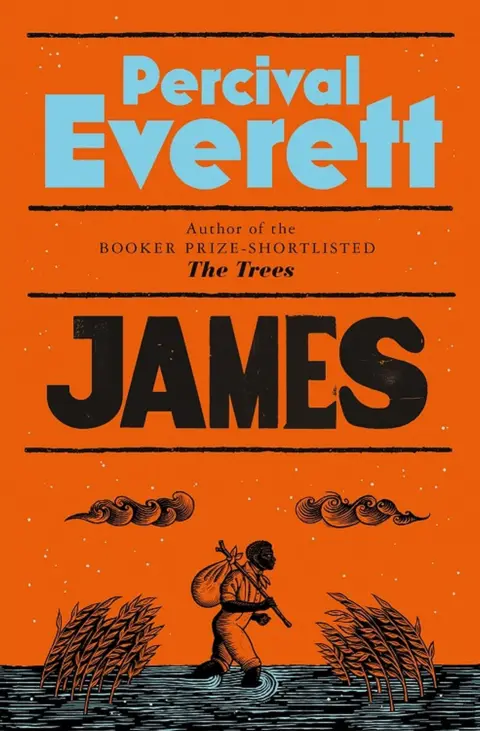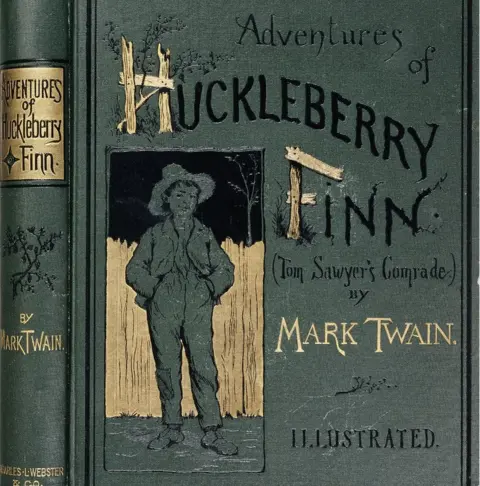Percival Everett: Why I rewrote Huckleberry Finn to give slave Jim a voice
 Getty Images
Getty ImagesPercival Everett, whose novel Erasure was turned into the Oscar-winning film American Fiction, had the idea for his latest book, James, when he was playing tennis.
The Booker Prize-nominated author had just hit a ball "wildly" out of court.
"I stopped and thought, 'I wonder if anyone has written Huck Finn from Jim's point of view?'".
They hadn't, so Everett did.
The writer adds this particular thought was nothing to do with his game, just that it was "the way most ideas come".
Critics have called Everett's resulting novel a "masterpiece" describing him as "an American master at the peak of his powers".
 Macmillan
MacmillanThe hero of his new novel is - famously - the runaway slave Jim, in Mark Twain's The Adventures of Huckleberry Finn, published in 1884.
The book is written from Huck's perspective, a boy who fakes his own death to escape his abusive father.
Jim's also on the run, having found out he is about to be sold to a new owner.
Despite being a renowned fictional character, relative to Huck, Jim's on the margins of a book that Ernest Hemingway described as the definitive American novel.
As Everett puts it, Jim "doesn't get to speak" in the original novel. Not properly anyway.
Everett has given him a voice.
Jim reimagined
In an interview ahead of the novel's publication in the UK, Everett tells me he believes the US has "taken some steps back" when it comes to racial unity in recent years.
He points to the "alarming rate" of police killings of people of colour, describing them as "lynchings" and says the legacy of slavery has still "never fully been addressed".
By reimagining Jim (who writes himself into existence with a stolen pencil stub as James), Everett has made him human, instead of the sometime stereotype put on paper by Twain.
In James, he has agency; we find out how he feels about the world, what he thinks about his nation and about racism.
He is literate and literary. He has conversations in dreams with philosophers. He is wise.
"What would they do to a slave who had taught the other slaves to read?" James asks himself. "What would they do to a slave who knew what a hypotenuse was, what irony meant, how retribution was spelled?"
It's a powerful device Everett uses to change the perspective.
 Getty Images
Getty ImagesIn his novel, the slaves speak a dumbed down dialect when they are talking in front of white people.
"I guess I jest gwyne set dese old bones down on dis heah porch and watch out for dat noise 'gin" says Jim.
They deliberately make themselves sound ridiculous and gullible.
But when they can't be overheard, the slaves use an eloquent, highly intellectual form of English, for example discussing "proleptic irony".
Everett explains that "any enslaved, imprisoned or oppressed people find a way to speak to each other in the presence of their oppressors that will not allow entry."
"The slaves would have a way of speaking to each other that is unintelligible to their slave owners. In my novel, it happens to be what we would call standard English".
In the book, James tells his daughter and the other children he is schooling in the "slave filter":
"White folks expect us to sound a certain way and it can only help if we don't disappoint them."
"The only ones who suffer when they are made to feel inferior is us" he adds.
It's classic Everett, a novelist who describes himself as "pathologically ironic".
At one point in James, a local judge seems more terrified by the fact that James's speech doesn't conform to his expectations, than by the fact that the runaway slave is pointing a gun at him.
The power of language looms large on every page.
 Historical Picture Archive
Historical Picture ArchiveTwain's original is anti-slavery, but it has become almost unteachable because of its liberal use of the N-word (the racist term is used more than 200 times in the novel).
The Adventures of Huckleberry Finn is no longer on the GCSE or A Level syllabus. To modern eyes, it's too problematic. It's even been banned by certain schools in America.
Everett is opposed to book banning - although he told me, he hopes they might ban his new book "only because I like irritating those people who do not think and read".
"States in the US can ban books if they like, but they cannot stop art".
"The first thing that fascist regimes do is they banned books or burned them. It's a way of trying to control others".
Everett calls Twain's original a "wonderful novel", the first time in American literature there is "a character who really represents an adolescent America wandering through its own landscape, trying to come to terms with what has become the most defining feature of the American experience, which is race".
Huck's "trying to reconcile the fact that his friend is a person, Jim's his friend, but he's also property".
It's "a pretty remarkable achievement".
The N-word
Like Twain, Everett uses the offensive term in his novel (though not nearly as often as the 19th Century classic).
He tells me it's all about context.
"The language that people use tells us about the people" which is why characters in his novel say that word.
"I really do appreciate a sign at the edge of a minefield that says 'mines'".
It's also about intent.
"If someone came into this studio right now and quite angrily called me, quite literally, you N-word, I would be just as offended because I would know what they meant".
Everett is professor of English at the University of Southern California. "The strange thing of course is that as a black man, I can say the word. And my students, they will not say it".
"Sensitivity to language is important and necessary, but we've become too literal-minded".
Race in America
Everett has now written 24 novels, many of which interrogate race in America.
The Trees, shortlisted for the Booker Prize in 2022, addresses lynchings past and present, often with humour. ("If you can get someone laughing, then you have disarmed them" which helps you "reveal some truths").
Erasure satirises the American publishing industry's complicity in perpetuating stereotypes about black America.
 Getty Images
Getty ImagesAnd James is taking on slavery and racial tropes.
Everett's pessimistic about the current state of racial division in the US.
He talks about "the swagger of white supremacists".
For a novelist so focused on language, it's perhaps not surprising Everett worries that "polarity of thought has replaced discourse".
He also worries that there's a faction in America that "would have us ignore the fact that slavery ever existed, and that's a way of ignoring how slavery has impacted the lives of people to this day".
His great-grandmother was at one point a slave. "That's how close it is to us in time".
He would like to see financial reparations as a "conciliatory act" although he says he would relinquish anything that was offered to him, in favour of people who actually need the money.
 Getty Images
Getty ImagesAs for anger, "there's a difference between rage and outrage".
"There's a part of me that is angry", he adds. But history shows "it's long and pretty much the same throughout".
That attitude fits with a man whose skill lies in observation. Everett says he's found an acceptance that slavery, mistreatment, injustice happen because of "the nature of human beings".
He takes comfort in a different kind of nature, particularly when he's indulging in one of his favourite hobbies - fly fishing. A stream is "the best place to work".
And when he's standing in a river "it's full of endless possibilities".
James is published in the UK on 11 April.
